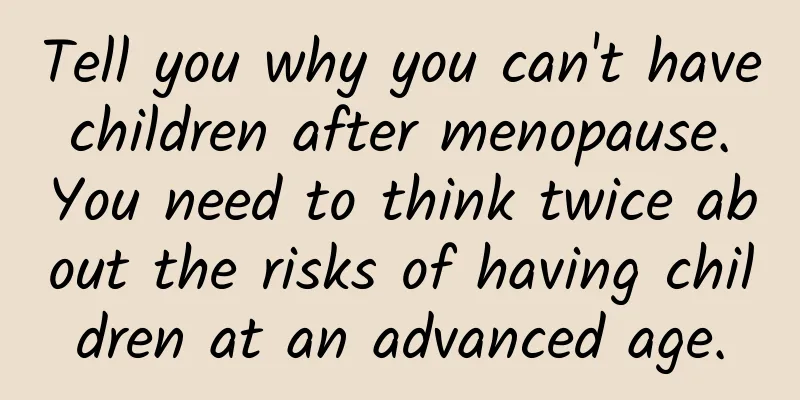Tell you why you can't have children after menopause. You need to think twice about the risks of having children at an advanced age.

|
Generally speaking, women's physical functions begin to decline at the age of 35, menopausal symptoms begin to appear at the age of 45-50, and menopause is basically complete at the age of 50. This is a natural and normal physiological phenomenon of menopause. Many female friends know that they cannot have children after menopause, but why can't they have children? Today I will tell you why you cannot have children after menopause. You need to think twice about the risks of giving birth at an advanced age. Let me tell you why you can't have children after menopause. The specific reasons are as follows: First point: Ovarian failure Under normal circumstances, women usually experience ovarian failure after the age of 45. Due to ovarian failure, estrogen secretion decreases, which leads to an accelerated disappearance of follicles, or the follicles do not develop or are poorly developed, and are unable to discharge eggs normally, thus causing difficulty in conception. Second point: uterine atrophy When a woman is facing menopause or has already gone through menopause, her uterus will shrink to varying degrees, no longer elastic and smooth, and unable to withstand pregnancy. The growth and development of the fetus cannot be separated from a high-quality uterine environment. If the uterus shrinks at this time, it will be very difficult to get pregnant. The third point: endocrine disorders Endocrine is the regulator of human physiological functions, and it works in the human body by secreting hormones. Amenorrhea can also cause a sharp decrease in hormones in the body, leading to metabolic disorders, resulting in ovulation disorders, amenorrhea, and infertility. Fourth point: The body cannot withstand pregnancy As age increases, body functions also decline. The arrival of menopause also causes women to lose calcium and their body resistance decreases. At this time, the body cannot withstand pregnancy to the late pregnancy, which may cause a series of pregnancy complications. For example: pregnancy-induced hypertension, gestational diabetes, and even threatened abortion and other adverse consequences. Fifth point: The probability of fetal abnormalities increases As older women age, their egg quality declines, and the husband's sperm quality also declines with age. According to relevant data, the incidence of fetal chromosomal aberration in the general population is about 1:800, and the incidence in older pregnant women over 35 is 0.4%. If the pregnant woman is over 40 years old, the risk rises to 1.4%. At this time, the embryo is very likely to have embryonic malformations during development, and the probability of fetal defects and missed abortion will increase. Point 6: Difficult childbirth Due to advanced age, the body will also lose flexibility due to decline. Therefore, older mothers often have a harder pelvis, less elastic ligaments and soft birth canal tissues, and correspondingly weakened uterine contraction force, which can easily lead to prolonged labor, even dystocia, fetal birth injuries and asphyxia. These risks cannot be ignored. The above is an explanation of why postmenopausal women cannot have children. It is not just because they cannot have children due to their advanced age and lack of eggs, but because there are more risks involved in having children at extremely advanced ages. In addition to the above-mentioned practical physical problems, having children at advanced ages often also involves a psychological hurdle. It is true that women have a low chance of getting pregnant after menopause, but it does not mean that there is no possibility of ovulation. The decline of ovarian ovulation function does not mean that there is no ovulation at all, especially in the early stage of menopausal transition, the ovulation cycle is gradually replaced by the anovulation cycle. The decline of ovarian function is not a sudden failure, but a gradual process. Due to individual differences, if you have a strong desire to have children, it is recommended to go to the hospital for a fertility assessment. Because menopause breaks the original ovulation pattern, ovulation time is difficult to predict, and ovulation may even occur more than once a month. Therefore, in the first few years of menopause, or even within a year after menopause, pregnancy is a fact of life. Of course, there are other people who have a strong desire to have children and can achieve successful childbearing through other means. |
<<: Clinical manifestations of perimenopausal syndrome
Recommend
Some precautions for clinical pelvic inflammatory disease
Pelvic inflammatory disease seriously endangers t...
47 years old, the menstrual flow lasts for ten days and is still heavy
47 years old, the menstrual flow lasts for ten da...
What are the dangers of habitual miscarriage? Pay attention to these 3 aspects
There are many reasons for habitual miscarriage. ...
KO leg edema! Doing yoga "grinding wheat pose" is very effective
With many consecutive holidays, many people trave...
If you plan to start doing yoga at home, here are 8 things you must know
Girls who want to spend more time doing yoga but ...
Are uterine fibroids hereditary?
Are uterine fibroids hereditary? Uterine fibroids...
How to regulate menstrual irregularities during menopause? How to regulate menstrual irregularities?
Women in menopause are also prone to irregular me...
New dietary goals for threatened abortion
Any disease has its own requirements for diet, an...
A low-sugar diet starts with reducing refined starch! 4 tips to avoid refined starch, learn them now
Being fat seems to be the most feared thing in ev...
A dietary recipe suitable for nourishing and recovering women after abortion
After an abortion, women are weaker and need to c...
Let's learn about the symptoms of ovarian cysts from the following article
Among gynecological diseases, ovarian cyst diseas...
Can’t get rid of belly fat? Find the culprit: Hormone imbalance leads to fat accumulation
Many people are troubled by a belly fat. Even if ...
Experts explain the clinical manifestations of cervicitis
What kind of disease is cervicitis? I believe man...
How long does it take to get menstruation after abortion?
How long does it take to get your period after an...
Women should always take precautions against vaginitis
Among gynecological diseases, vaginitis is also a...









